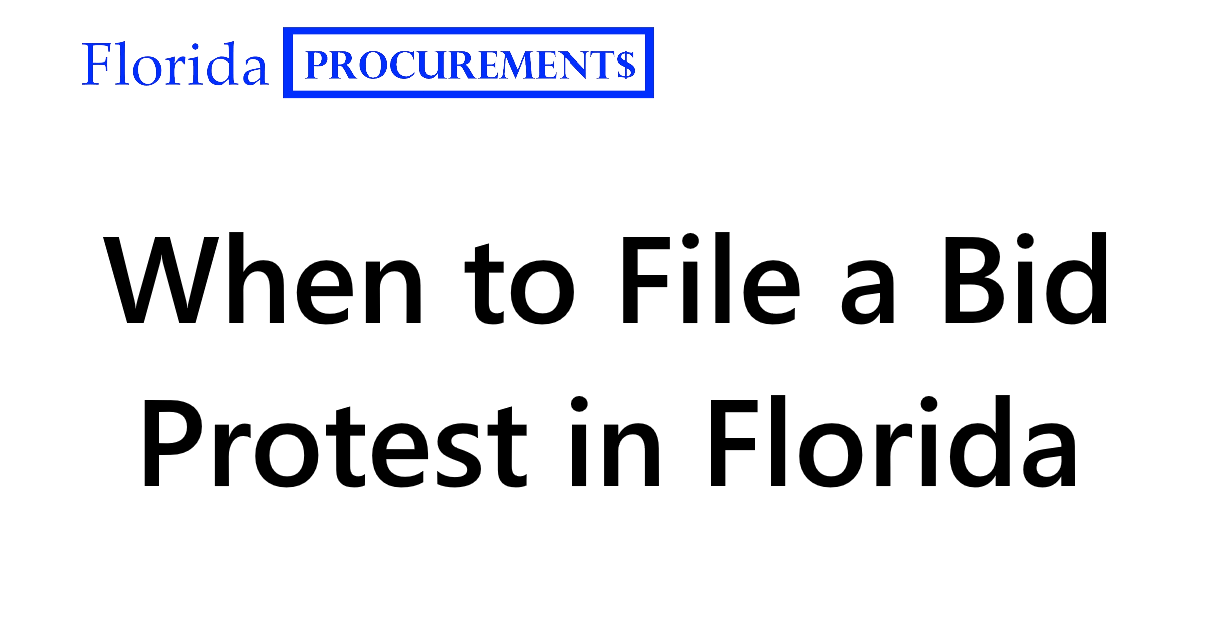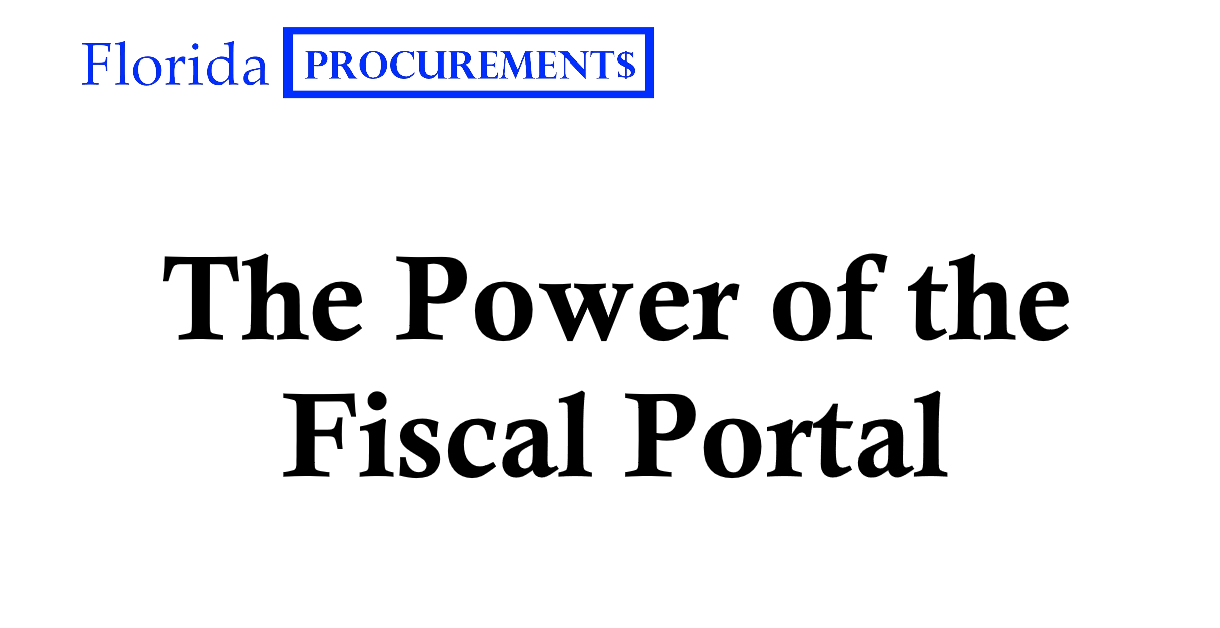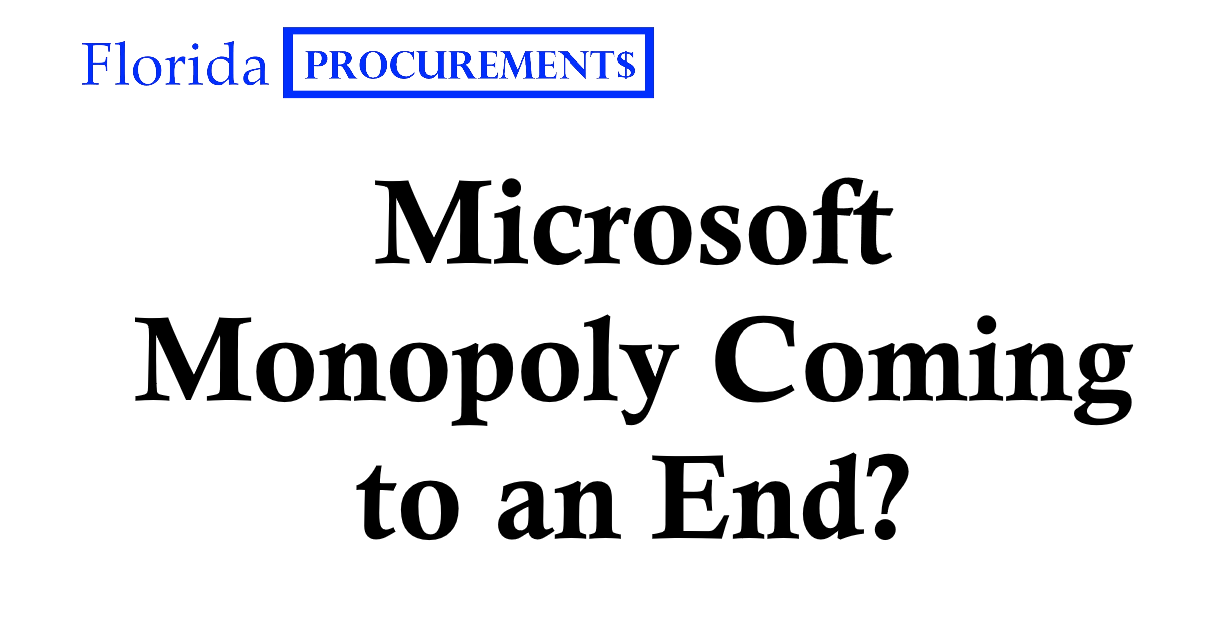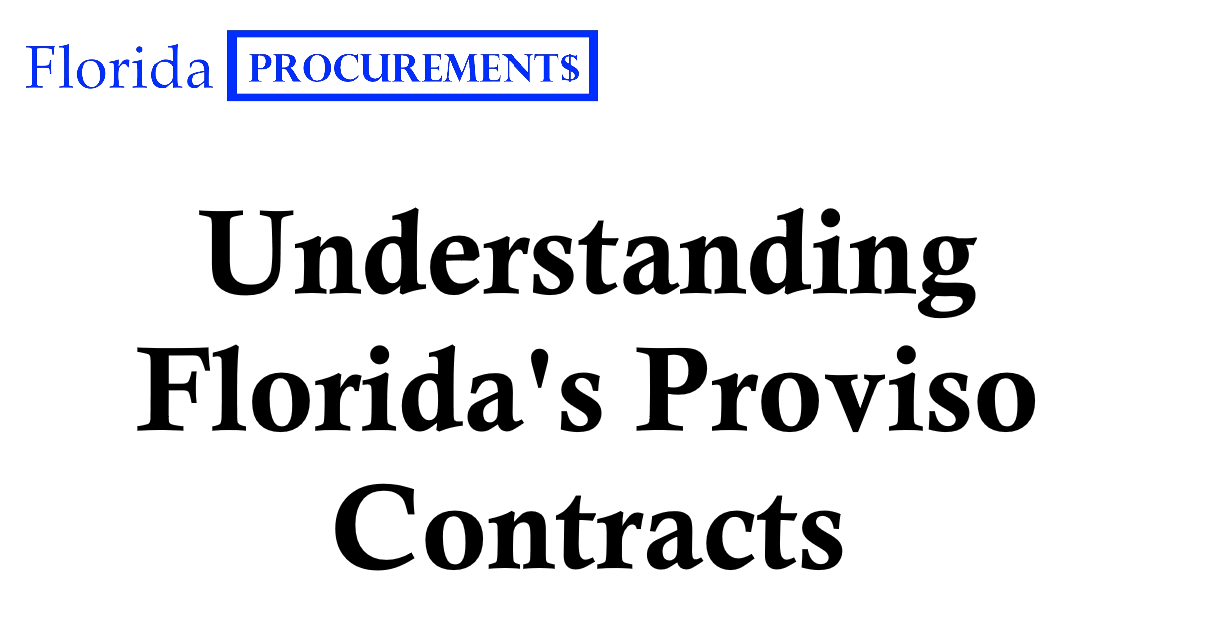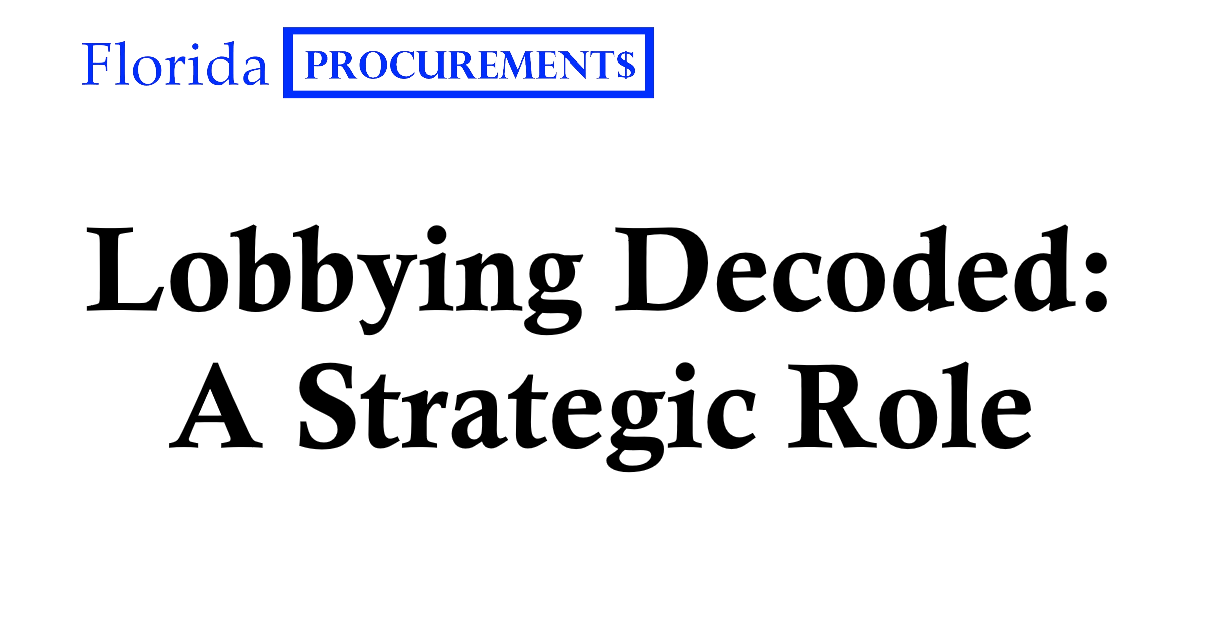
- March 5, 2025
- Sean Gellis
- 0
Welcome to FloridaProcurements.com (FlaProc), your authoritative resource for navigating Florida’s government contracting landscape, with particular focus on transportation and technology opportunities. FlaProc provides free, expert guidance to help companies identify and secure state contracting opportunities throughout Florida.
This resource is maintained by Attorney Sean Gellis of Gellis Law, PLLC, one of less than 75 attorneys Board Certified in State and Federal Government and Administrative Practice by The Florida Bar. Mr. Gellis brings unique insight to government contracting, having served as the Chief of Staff of the Florida Department of Management Services (DMS), General Counsel of the Florida Department of Transportation (FDOT), and Deputy General Counsel of the Florida Office of Insurance Regulation – positions that provided direct oversight of technology initiatives and issues of statewide importance. His record in bid protest litigation reflects the sophisticated advocacy and strategic thinking he brings to government contracting matters, particularly in complex transportation and technology procurements. Sean also leads Procurement Insider, a confidential subscription service that provides technology vendors with strategic intelligence and insider analysis of Florida government opportunities. Learn more about transforming your approach to government contracting at www.gellislaw.com/procurement-insider
The Strategic Role of Lobbyists in Government Contracting: An Insider’s View
During my tenure as FDOT General Counsel and DMS Chief of Staff, I sat across the table from countless lobbyists and government consultants. Some were brilliant strategists who delivered tremendous value for their clients. Others… well, let’s just say they collected checks while delivering nothing but false hope. Today, I want to pull back the curtain on this often misunderstood profession and explain why it matters in government contracting.
The Evolution of Government Relations in Florida
Before diving into practical insights, it’s worth noting how government relations has evolved in Florida. I’ve heard that many years ago lobbying was often personality-driven and relationship-based. Today, it has matured into a sophisticated discipline that combines policy expertise, procurement knowledge, and strategic communications.
This evolution stems partly from increasingly complex procurement regulations. Florida’s procurement landscape has grown more structured with each legislative session, creating a maze of statutes, rules, and procedures that even experienced vendors struggle to navigate. As government purchasing became more regulated, effective lobbying transformed from simply “knowing people” to understanding complex systems.
Additionally, transparency initiatives have changed how influence works. With procurement decisions subject to greater public scrutiny, the days of backroom deals have largely disappeared. Today’s successful government relations professionals operate in full view, focusing on legitimate advocacy rather than leveraging personal connections.
Beyond the Stereotypes
Let’s start with something many people misunderstand: government relations professionals aren’t just glad-handing influence peddlers. The effective ones function as strategic navigators through the complex maze of government decision-making.
I remember one particular meeting where a technology firm arrived with their lobbyist to pitch an innovative traffic management system. Before the meeting, I spoke with the lobbyist who told me he carefully briefed them: “They can’t sign today. Purchasing rules don’t allow it. This is about planting seeds for the next procurement cycle.” That level of expectation-setting proved invaluable – instead of pushing for an impossible immediate sale, they focused on understanding our needs and constraints, positioning themselves perfectly for the future procurement.
This scenario highlights a crucial distinction: amateur lobbyists focus on immediate transactions, while professionals understand government contracting as a multi-year strategic endeavor. The professional approach involves aligning with agency priorities long before RFPs or ITNs hit the street.
What the Good Ones Actually Do
The most effective government consultants I encountered brought several critical values to their clients:
Access to Decision Makers
While an unsolicited email from an unknown vendor might sit unanswered, a call from a respected lobbyist often opens doors to senior leadership. During my time at FDOT and DMS, we maintained busy schedules, but made time for established government relations professionals because they typically brought well-prepared clients with relevant solutions.
This access isn’t about circumventing rules—it’s about ensuring good ideas reach the right audience. I witnessed countless innovative solutions that would have remained undiscovered without someone who knew which doors to knock on and when.
The value isn’t just in creating meetings; it’s in ensuring those meetings occur with the appropriate decision-makers. I’ve seen companies waste months meeting with officials who lacked the authority or budget to advance their proposals, a mistake good lobbyists prevent.
Multi-Level Strategy
Government doesn’t operate in silos. A sophisticated lobbyist doesn’t just target one agency – they simultaneously engage the Legislature for potential appropriations, the Governor’s office for policy priorities, and agency leadership for implementation. I’ve watched complex initiatives succeed precisely because a skilled lobbyist orchestrated this three-dimensional chess game.
A particularly memorable example involved a transportation safety initiative that required both funding and regulatory changes. The lobbyist methodically built support through:
- Legislative committee briefings that established budget support
- Policy coordination with the Governor’s transportation safety staff
- Technical discussions with FDOT engineers and project managers
- Stakeholder engagement with affected industry groups
Each strand of this strategy reinforced the others, creating momentum that no single-channel approach could have achieved.
Procurement Intelligence
The best government consultants possess deep understanding of procurement laws and timelines. They know when agencies are planning solicitations, how requirements are developed, and where opportunities exist for their clients. This institutional knowledge proves invaluable for companies navigating complex government markets.
During my time at DMS, I observed how the most effective lobbyists maintained comprehensive knowledge of:
- Annual budget cycles and their impact on purchasing
- Agency strategic plans and their implementation timelines
- Historical procurement patterns that indicated future needs
- The internal approval chains required for different purchase categories
- Emerging policy priorities that would drive future spending
This intelligence allows companies to align their business development efforts with realistic opportunities rather than chasing unwinnable or non-existent contracts.
Translation Between Sectors
Perhaps the most underappreciated function of effective government relations professionals is their ability to translate between public and private sector languages. Government and business often speak in completely different dialects about the same topics.
I’ve witnessed many meetings where vendors became frustrated with procurement terminology or procedures, while agency staff grew impatient with private sector expectations. Good lobbyists bridge this gap, helping their clients understand concepts like:
- The difference between “best value” in government versus private sector contexts
- Why agencies prioritize certain evaluation criteria over others
- How public accountability affects decision-making timelines
- The constraints created by appropriations and budget authority
- The distinction between policy priorities and operational purchasing
This translation function prevents misunderstandings that can derail promising opportunities before they begin.
The Relationship Between Lobbyists and Government Attorneys
As General Counsel at FDOT, I worked extensively with the legal dimensions of lobbying activities. The relationship between government attorneys and lobbyists is particularly nuanced—and often misunderstood by the clients paying for representation.
Government attorneys serve as guardrails, ensuring that relationships between agencies and vendors remain within legal boundaries. When lobbyists approached me with requests that pushed legal boundaries, my answer was invariably “no” regardless of their political connections or relationship capital.
However, the most sophisticated lobbyists learned to work productively with agency counsel in several ways:
- Using counsel as a resource to understand legal constraints before proposing solutions
- Engaging attorneys early in discussions about innovative approaches
- Focusing on permissible alternatives rather than trying to circumvent requirements
- Understanding when legal interpretation offered flexibility versus when statutes created hard boundaries
The most effective government relations strategies incorporate legal considerations from the outset rather than treating them as obstacles to be overcome after the fact.
Managing Expectations
Here’s where many client-lobbyist relationships break down: unrealistic expectations.
During my government service, I witnessed meetings where agency directors expressed genuine interest in a product, only for the procurement office to later determine it couldn’t be purchased without competition. I watched lobbyists who failed to prepare their clients for this reality face awkward moments when deals fell apart.
The government procurement process moves at its own pace – often measured in months or years, not days or weeks. Effective lobbyists manage this reality upfront, explaining the long game to clients who may be accustomed to faster private sector sales cycles.
This expectation management should include several key components:
- Realistic timelines from initial interest to contract execution
- Budget cycle implications and their effect on purchasing decisions
- The distinction between exploratory conversations and procurement commitments
- The role of competitive requirements in limiting direct awards
- The multiple approval layers required for significant purchases
I’ve seen companies terminate effective lobbyists due to “lack of results” when the real issue was unrealistic timeline expectations. Smart government relations professionals establish clear metrics and milestones that reflect government reality, not private sector wishful thinking.
The Relationship Dance
Here’s an insider secret worth understanding: when government officials praise a lobbyist in front of their client, take it with a grain of salt. This is part of a well-choreographed dance.
As an agency leader, I always treated lobbyists respectfully and acknowledged their relationships – it costs nothing and helps maintain professional connections. But this courtesy doesn’t necessarily translate to actual influence over procurement decisions, which remain governed by strict regulations.
Smart clients understand this dynamic rather than being seduced by apparent coziness between their representative and government officials.
The most sophisticated clients evaluate their government relations professionals not by how many officials call them by their first name, but by:
- Accurate intelligence about upcoming opportunities
- Realistic assessments of competitive positioning
- Strategic guidance that aligns with agency priorities
- Thoughtful navigation of procedural requirements
- Measurable progress toward defined objectives
During my time at DMS, I observed how vendors who misinterpreted cordial relationships as guaranteed contracts often found themselves disappointed when formal procurement processes began.
Legal Limitations
One of the most valuable lessons I learned as General Counsel: a lobbyist’s influence stops at the legal department’s door.
I can’t count how many times I had to deliver a firm “no” to well-connected lobbyists when their requests collided with procurement regulations. No amount of relationship capital can override legal requirements – which is why the attorney-lobbyist combination can provide unique value.
Lobbyists who also maintain legal credentials bring the additional option of potential legal challenges when appropriate. While litigation should never be a first resort in government relations, having this capacity creates legitimate leverage in appropriate circumstances.
The intersection of lobbying and legal expertise becomes particularly valuable in several contexts:
Procurement Challenges
When an agency’s procurement decisions appear to violate established procedures or statutory requirements, the ability to quickly evaluate and potentially challenge those decisions creates powerful leverage. During my tenure at FDOT, we were more likely to re-examine decisions when presented with legitimate legal concerns rather than political pressures.
Regulatory Navigation
Florida’s administrative framework creates numerous regulatory hurdles for companies entering new markets. Lobbyists with legal backgrounds can identify regulatory flexibility and potential waiver opportunities that might otherwise block market entry.
Contract Negotiation
The standard terms in government contracts often contain provisions that create significant risk for vendors. Government relations professionals who understand both the political and legal dimensions can more effectively negotiate these terms, knowing which are flexible and which represent non-negotiable statutory requirements.
Legislative Solutions
When existing laws create legitimate barriers to innovation, the combination of legal knowledge and government relations allows for targeted legislative solutions. I’ve seen effective lobbyist-attorneys draft precise statutory changes that opened markets without creating unintended consequences.
Industry-Specific Considerations
Having worked extensively with both technology and transportation sectors, I’ve observed how lobbying strategies must adapt to different industry contexts. Government relations approaches that succeed in one sector often fail in others.
Technology Sector
Technology companies face unique challenges in government contracting:
- Rapid innovation cycles that outpace procurement timelines
- Legacy systems that create interoperability requirements
- Security and data privacy considerations
- Customization needs for government applications
- Long-term maintenance and support requirements
Effective government relations in technology requires focusing on:
- Education before sales: Many government officials lack technical background to evaluate innovative solutions. The best technology lobbyists focus on education, not just promotion.
- Pilot project opportunities: Given procurement constraints, technology companies often benefit from pilot projects that demonstrate value before larger commitments. Skilled lobbyists identify these pathways.
- Standards alignment: Understanding government technology standards and helping clients align their solutions accordingly creates competitive advantage.
- Procurement vehicle navigation: Identifying the appropriate contract vehicles (state term contracts, alternate contract sources, etc.) often determines success or failure.
Transportation Sector
Transportation contracting has its own unique characteristics:
- Long project timelines spanning multiple budget cycles
- Extensive regulatory requirements and environmental considerations
- Complex stakeholder environments including federal, state, and local entities
- Significant public visibility and community impact
- Specialized certification and qualification requirements
Successful transportation sector lobbying typically emphasizes:
- Long-term relationship building: Given project timelines measured in years or decades, sustainable relationships prove more valuable than quick wins.
- Technical credibility: Transportation agencies prioritize proven solutions with demonstrated safety and reliability records. Effective lobbyists highlight these credentials.
- Qualification positioning: Many transportation procurements require pre-qualification. Savvy government relations professionals help clients position for these requirements well in advance.
- Federal-state coordination: Given the significant federal funding in transportation, understanding the interplay between federal and state requirements creates strategic advantage.
Building an Effective Government Relations Strategy
For companies considering investment in government relations, I recommend a structured approach based on what I’ve seen work from the agency perspective:
- Develop Clear Objectives
Begin by defining precisely what you want to achieve through government engagement. Is it contract opportunities? Regulatory change? Market access? Each requires different strategies and metrics.
- Conduct a Realistic Assessment
Evaluate your current position in the government marketplace honestly. Do you have established relationships? Past performance? Unique capabilities that align with agency needs? Understanding your starting point prevents wasted effort.
- Map the Decision Landscape
Identify all stakeholders involved in your target opportunities. This includes not just obvious decision-makers but also influencers, technical evaluators, procurement officials, and budget authorities. Effective lobbying addresses all relevant audiences.
- Develop Multi-Channel Engagement
Create a government relations plan that leverages multiple avenues of engagement:
- Direct agency relationship building
- Industry association participation
- Legislative education and engagement
- Media and thought leadership
- Strategic partnerships and teaming
- Establish Realistic Timelines
Develop timelines that reflect government realities, including budget cycles, leadership transitions, and procurement schedules. Most government opportunities require 12-24 month horizons for meaningful progress.
- Measure What Matters
Create meaningful metrics to evaluate government relations performance. These might include:
- Meetings with key decision-makers
- Inclusion in agency planning discussions
- Invitations to provide input on requirements
- Advance intelligence about upcoming opportunities
- Qualification for contract vehicles
- Shortlisting for major procurements
Measuring activity (meetings held) rather than outcomes (contracts won) often proves more helpful in evaluating government relations effectiveness, especially in early stages.
Common Pitfalls to Avoid
Based on my observations from the government side of the table, companies should avoid several common mistakes in their lobbying efforts:
- Over-relying on Political Connections
I’ve seen companies hire lobbyists based solely on their political relationships, only to discover those connections couldn’t overcome fundamental procurement requirements. Political access can open doors but rarely seals deals without substantive value.
- Neglecting Technical Credibility
Government agencies ultimately purchase solutions, not relationships. The most politically connected lobbyist cannot overcome a lack of technical merit or competitive pricing.
- Misunderstanding Agency Constraints
Companies frequently become frustrated when agencies express interest but don’t immediately purchase. This usually stems from misunderstanding budget cycles, procurement requirements, and authorization limitations rather than lack of genuine interest.
- Treating All Agencies Alike
Each Florida agency has its own culture, procurement practices, and decision-making structures. Strategies that work at FDOT may fail entirely at DMS or the Department of Health. Effective government relations adapts to these differences.
- Ignoring Competitive Realities
Many companies enter government markets assuming their solution is unique, only to discover multiple competitors already established in the space. Realistic competitive assessment should precede any government relations investment.
The Ethics of Effective Lobbying
Ethical considerations should remain paramount in government relations strategies. During my public service, I developed clear perspectives on ethical versus problematic lobbying approaches:
Ethical Approaches:
- Providing accurate, relevant information to inform government decision-making
- Highlighting genuine capabilities and past performance
- Suggesting innovative solutions to legitimate agency challenges
- Offering subject matter expertise on complex topics
- Facilitating connections between agencies with similar needs
Problematic Approaches:
- Exerting political pressure to circumvent procurement requirements
- Misrepresenting capabilities or experience
- Attempting to influence technical specifications to exclude competitors
- Using relationships to gain inappropriate access to competitors’ information
- Promising post-government employment to current officials
The most effective government relations professionals build their reputation on ethical advocacy, recognizing that short-term gains through questionable methods ultimately damage long-term credibility.
The Future of Government Relations
Looking forward, several trends appear likely to reshape government relations in Florida:
- Increased Transparency Requirements
Expect continued expansion of transparency requirements around lobbying activities, including more detailed disclosure of contacts and compensation. Companies should prepare for greater public scrutiny of their government relations activities.
- Technology-Enabled Procurement
As procurement systems become increasingly digital, the nature of influence will evolve. While relationships will remain important, data-driven procurement systems may reduce discretionary decision-making in certain categories.
- Expertise-Driven Advocacy
As government challenges grow more complex, subject matter expertise will increasingly differentiate effective government relations professionals from those relying primarily on relationships.
- Outcomes-Based Contracting
The shift toward outcomes-based contracting in many government sectors will require lobbyists to articulate value propositions differently, focusing more on measurable results than features and specifications.
- Collaborative Approaches
Increasingly complex problems require multi-vendor solutions. Forward-thinking government relations strategies will focus more on creating collaborative opportunities rather than solely pursuing individual contracts.
The Bottom Line for Businesses
Should your company invest in government relations support? It depends on your goals and resources. Consider these factors:
When a lobbyist makes sense:
- You’re pursuing substantial, complex government opportunities
- Your solutions align with agency needs but require navigation to the right decision makers
- You need ongoing intelligence about government priorities and procurement plans
- You’re entering government markets for the first time
- Your competitors already utilize effective government relations
- Your offerings involve innovative approaches that require education and explanation
When to reconsider:
- You expect immediate results
- Your budget only allows for short-term engagement
- You’re unwilling to adapt your approach to government requirements
- You believe relationships alone can circumvent procurement rules
- You lack competitive offerings regardless of relationship access
- You haven’t established the operational capacity to deliver on government contracts
Investment Considerations
Companies often struggle with determining appropriate investment levels for government relations. While circumstances vary, successful government contractors typically invested:
- 3-5% of expected contract value for large opportunities ($10M+)
- 5-8% for mid-sized opportunities ($1-10M)
- 8-12% for smaller opportunities (under $1M)
These percentages typically covered comprehensive government relations, including lobbying, relationship development, intelligence gathering, and strategic positioning. Companies that invested significantly less often found themselves outmaneuvered by better-represented competitors.
Strategic Timing
Timing represents perhaps the most chronically misunderstood aspect of government relations. Based on my experience, here’s when different types of engagement prove most effective:
- 2-3 years before procurement: Strategic relationship building, education on innovative approaches, input on future requirements
- 12-18 months before procurement: Deeper engagement with technical staff, demonstration of capabilities, qualification positioning
- 6-12 months before procurement: Formal capability presentations, specific solution discussions, teaming arrangements
- During active procurement: Strictly limited engagement following procurement rules
Companies that begin lobbying activities during or shortly before active procurements typically waste their investment. By that point, requirements are largely established and relationship-building opportunities limited by procurement regulations.
Looking Forward
The government contracting landscape continues evolving, but skilled government relations professionals maintain their value by helping businesses translate their offerings into solutions for public sector challenges.
Remember that even the best lobbyists can’t work magic – they’re facilitators, not miracle workers. The most successful government contractors combine strong lobbying with compelling solutions, competitive pricing, and patience for the unique rhythm of public procurement.
Need guidance navigating government contracting relationships? Contact Gellis Law for sophisticated counsel informed by direct experience on both sides of the table.
Sean Gellis is a Board Certified specialist in State and Federal Government and Administrative Practice and former General Counsel of the Florida Department of Transportation and Chief of Staff of the Department of Management Services. Through Gellis Law, PLLC, he provides strategic counsel on transportation, technology, and regulatory matters, drawing on his experience in both agency leadership and private practice.


